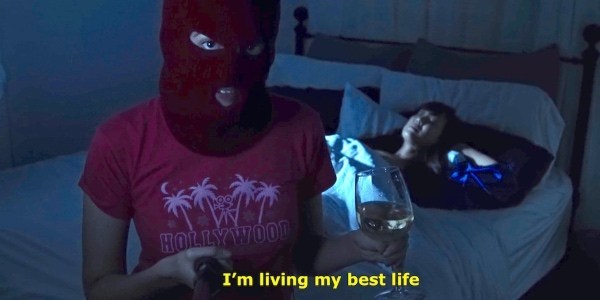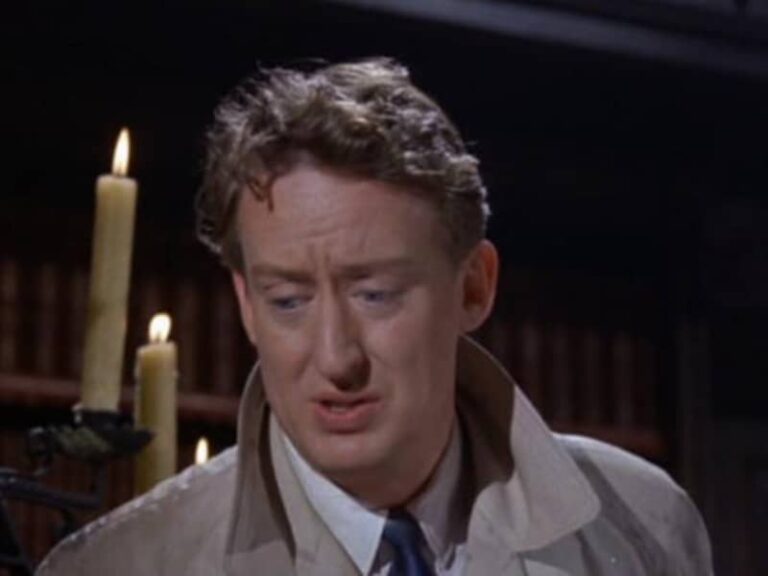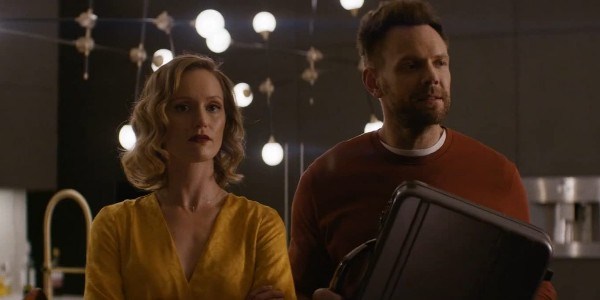THE ASCENT Criterion Review: A Flawless Work Of Soviet Cinema
Nearly four and a half decades since its release, Larisa Shepitko’s 1977 film The Ascent remains a crowning achievement like no other. Shepitko additionally helmed the films Wings (1966), Beginnings of an Unknown Era (1967), In the 13th Hour of the Night (1969), and You and Me (1971), but the Soviet director’s career was tragically cut short in a fatal car accident in 1979. However, her legacy lives on to this day, and The Ascent, Shepitko’s final feature and the one that many refer to as her magnum opus, continues to leave an immeasurable hold on every one of its viewers.
The Ascent takes place during the Second World War and follows two Soviet partisans (Boris Plotnikov and Vladimir Gostyukhin) who, while attempting to gather supplies from nearby Belarusian villages, are captured and imprisoned by German soldiers. In the many years since its release and Shepitko’s death, the film has gone on to become one of Soviet cinema’s finest features and stands the test of time as one of the most stunningly evocative war films of all time. It was awarded the Golden Bear at the 27th Berlin International Film Festival, making it the second film directed by a woman to win the award, as well as the second film in history directed by a woman to win a top award at a major European film festival. It truly sticks out from the crowd of other war films (including 1985’s equally masterful Come and See, directed by her husband Elem Klimov) because of Shepitko’s ability to set a specific mood through the film’s visuals and balance it without interrupting the weight that the narrative carries on its shoulders, in addition to her focus on the humanity within her subjects instead of letting them be overshadowed by the burden of the film’s setting.
As part of its January 2021 lineup, Criterion has prepared the film for a new Blu-Ray release (an upgrade from Criterion’s previous release of the film as part of their Eclipse DVD line over a decade ago). Much gratitude is extended to those at Criterion who were kind enough to send an early copy to review! Inside the case, a leaflet can be found, the cover of which is a still from the film that blends into the black theme of the leaflet very well. The leaflet opens up on one side to reveal an “About the Transfer” section, which details the specifics of the release in full. Below that, a section reading “Special Thanks” can be seen, as well as various acknowledgments, and on the next page, a list of production credits and additional credit to those who worked on restoring the movie for the new release. On the other side of the leaflet, an essay on the film by poet Fanny Howe can be read, titled Out in the Cold.
Video: 5/5
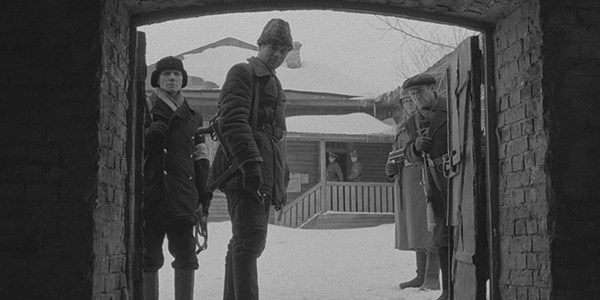
The Ascent is presented on Blu-Ray in its original aspect ratio of 1:37:1. The leaflet included in the release notes that the new digital transfer was created in 4K resolution from the 35 mm original camera negative and restored by the studio Mosfilm.
It’ll be easier to just cut to the chase here, so to put it simply, Criterion’s release of The Ascent is straight-up marvelous. The new 4K digital restoration of the film is an absolute masterclass from front to back, and a shining example of why Criterion is one of the greatest physical media distributors. Their commitment to restoring important classic and contemporary films is indisputable and with this release of The Ascent, they have proven once again that physical media will forever and always be the definitive viewing method for these influential features.
From the very first frame to the last, this restoration is a towering achievement. It’s a meritorious procurement, and a fine example of restoring a film to its fullest capacity without losing any of the technicalities of its original presentation. Image quality is nuanced and healthy. Interior visuals are more than satisfactory but it’s the exterior landscapes that steal the show, adding a terrific layer of depth to the film’s vast, sweeping scope. This is a film where the viewer can almost feel the blisteringly frigid winter setting as a device of slow atmospheric suffocation when combined with the horrifyingly raw story, and the Criterion Blu-Ray drives that home in spades.
Audio: 4/5
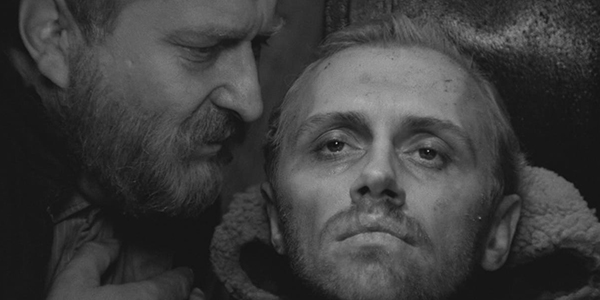
This new Blu-ray release of The Ascent features (as detailed in the “About the Transfer” section) an uncompressed monaural soundtrack, which is noted as being remastered from the 35 mm magnetic track.
Unsurprisingly, the audio on this release is exemplary, providing the viewer with a firm auditory experience that mixes wonderfully with the new 4K restoration. Right from the get-go, the transfer provides a perfect introductory showcase of the stability on display in this audio track as viewers are thrust into an ambush that quickly spirals into a gunfight. Every gunshot is crisp and dialogue clarity is staggering.
As the film goes on, there are plenty of other examples worth mentioning where the audio stands out, particularly another shootout approximately twenty minutes in which carries a measurably definite weight to it, as well as an extended sequence where five characters are trapped in the confines of a cellar. The latter relies on the script and the astonishingly raw performances unlike any other scene in the film and the audio amplifies the conversations greatly.
This is overall a really great monaural audio track that balances out the film’s presentation and heightens the experience, contributing to the Blu-Ray’s terrific ability to match the film’s skill of maintaining a strong and powerful hold on those who watch it.
Special Features: 4/5
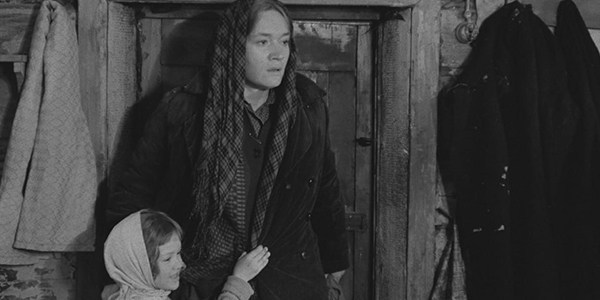
This release of The Ascent arrives with a more than adequate assortment of supplemental features on the disc, including:
- ANTOM KLIMOV INTRODUCTION: In this introduction, recorded for the Criterion Collection in September 2020, journalist Anton Klimov talks about the singular vision of his mother, director Larisa Shepitko, for The Ascent, and the devotion to her work of his father, filmmaker Elem Klimov.
- SELECTED-SCENE COMMENTARY: In this program, crafted for the Criterion Collection in 2020, film scholar Daniel Bird compares several scenes from The Ascent with their counterparts in Vasil Bykov’s 1970 novella Sotnikov, which inspired Larisa Shepitko’s film, and examines the way the film makes use of Alfred Schnittke’s score.
- 1. Without Compromise
- 2. The Problem of Choice
- 3. The Material World
- 4. The Sleigh Ride
- 5. The Grand Inquisitor
- 6. The Tomb
- 7. The Ascent
- 8. Rybak
- LYUDMILA POLYAKOVA: In the following interview, recorded for the Criterion Collection in Moscow in October 2020, actor Lyudmila Polyakova discusses the production of The Ascent and Larisa Shepitko’s impact on her career.
- THE HOMELAND OF ELECTRICITY: An adaptation of a story by Andrei Platonov, this short film by Larisa Shepitko was created as part of a 1967 omnibus film entitled Beginning of an Unknown Era, commissioned to honor the fiftieth anniversary of the October Revolution. Soviet authorities deemed the depiction of the early Bolsheviks in Shepitko’s story too critical, and it was shelved upon completion. With the help of Shepitko’s widower, Elem Klimov, the film was finally screened in 1987.
- LARISA: Director Larisa Shepitko’s husband, Elem Klimov, made this short documentary a year after the death of his wife in 1979. Using footage from her films, including the last image she ever recorded, as well as voice recordings and photos, Klimov’s film is a loving tribute to his wife’s life and work.
- A TALK WITH LARISA: This 1999 program, broadcast on the Russian television channel Kultura, features an introduction by filmmaker Elem Klimov and film critic Irina Rubanova to an interview with director Larisa Shepitko that was recorded just after the 1978 Berlin International Film Festival.
- ISLANDS: This 2012 program on the life and career of Larisa Shepitko was broadcast on the Russian television channel Kultura and features interviews with the director’s sister Emilia Tutina and son, Anton Klimov.
- MORE THAN LOVE: This 2012 program exploring the relationship between filmmakers Larisa Shepitko and Elem Klimov was broadcast on the Russian television channel Kultura and features interviews with Klimov’s brother, the writer German Klimov, and screenwriter Natalya Ryazantseva.
There’s a phenomenal compilation of special features included on this disc. While multiple provide deeper insight into the film and Shepitko’s inestimably cogent vision for it, others are simply excellent additions to an already exceptional disc.
Overall Score: 5/5
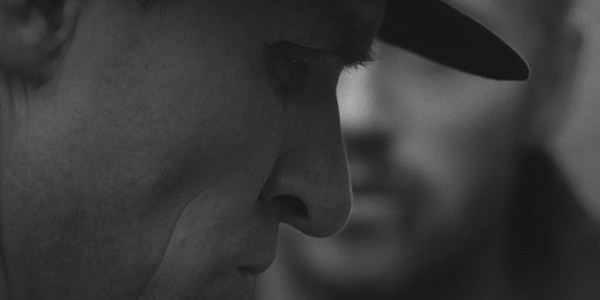
It’s incredibly hard to digest the full incalculable power of Larisa Shepitko’s The Ascent on first viewing, and even more difficult to put that power into words. What Shepitko manages to do in just under two hours is craft a tale that challenges the viewer at every turn, utilizing masterful combinations of script and visual motifs to weave a story as dually agonizing to watch as it is impossible to look away from. The Ascent is a physically shattering viewing that will leave anyone who views it reeling from the excruciatingly merciless narrative and the film’s undeniably soul-crushing final moments. Shepitko explores of the fragility of hope and the existential immediacy of pure, inescapable fear through multiple perspectives within the confines of this terrifying, yet immensely moving masterpiece.
Criterion’s new 4K restoration of the film is remarkable, and an essential addition to any collection. Picture quality is outstandingly sharp and rife with detail, while the uncompressed monaural audio track and a slew of engaging supplements are superb, and round out the release. This Blu-Ray of The Ascent is virtually flawless on all fronts (as much so as the film itself) and comes highly recommended.
Will you be picking up The Ascent? Let us know in the comments!
The Ascent will be released on Blu-Ray on January 26, courtesy of Criterion.
Does content like this matter to you?
Become a Member and support film journalism. Unlock access to all of Film Inquiry`s great articles. Join a community of like-minded readers who are passionate about cinema – get access to our private members Network, give back to independent filmmakers, and more.
Join now!
